CLTS Foundation Global’s Support to Mozambique: Scaling up for an ODF Nation by 2025
CLTS Foundation Global has been invited by the Government of Mozambique, in partnership with UNICEF and UK Aid to hold high-level institutional triggering in Maputo and its provinces between 12th to 26th April 2018. The team headed by Dr Kamal Kar will conduct policy level discussions with key functionaries including Ministers, administrators and development professionals to speed up efforts towards ODF Mozambique.
Advocacy meetings to motivate Ministers and senior technical staff in Maputo (25th April 2018)
The two meetings scheduled for 25th April set out to pull together all the work of the last two weeks and present it in advocacy meetings to motivate Ministers and senior technical staff to back the CLTS effort.
To begin: an inter-sectoral meeting of senior National Government staff, along with representatives from partners and international NGOs active in the WASH sector. The aims: to enhance understanding of CLTS; to highlight the need for inter-sectoral coordination and collaboration, and to begin analysis of the practical steps that can be taken towards this.
To enhance understanding of the approach, four District Administrators from Tete and Manica provinces, where CLTS has made good progress, were invited to summarise their successful experience and elaborate on what they did ‘differently’ to get the process going. Participants were then asked to brainstorm in small, intersectoral groups on the concrete steps which could be taken within ministries to enhance collaboration and support scaling up. Their recommendations included aligning monitoring indicators; identifying budget from available sources at Provincial level, and the speedy disbursal of funds to support Provisional and District level plans.
The afternoon’s high level meetings were attended by four key figures:: Higino Francisco de Marrule, Minister of Agriculture and Food Security; Adriano Maleiane, the Minister of Finance; Carlos Bonete Martinho, Minister of Public Works and Dr Zacarias Zindoga, Permanent Secretary to the Ministry of Health. The National Director of the Ministry of State Administration also attended, responsible for all of Mozambique’s 151 District Administrators. Other participants included senior technical staff from Ministries and leadership from a number of partner organisations.
The meeting included an overview of Mozambique’s relatively poor performance on sanitation in comparison to ESAR neighbouring countries and a brief orientation on the CLTS approach. It also saw District Administrators from Tete and Manica present their good practice stories to Ministers. Remarkably – and thanks to the CLTS Foundation Global methodology – it also saw engaged discussions on sanitation issues by Ministers in small groups structured to include high level technical staff and partners alongside the guests of honour. While Ministers were not, at this point, ready to state specific commitments, the sanitation situation in Mozambique – and how it can be improved – is once again on the agenda of several powerful actors.




Institutional Triggering at the sub-national level (23rd April 2018)
Advocacy meeting and Institutional Triggering, Zambezia Province
Bringing CLTS to scale involves changes in the third of the 3 CLTS circles: The Enabling Environment. While the Training of Trainers held between 16-20th April has done much to lay the foundation for the spread of CLTS tools and techniques, and for attitude and behaviour change among key actors, there are still some key factors related to the enabling environment which need to be established if approach is to witness successful scaling up in order to achieve the first ODF Districts in Zambezia and eventually an ODF Province.
In Mozambique, much has been done already to address this domain: the sanitation policy promotes CLTS (here, Santolic) as the sanitation approach, and budgets are in place – through partner support – via the Ministry of Public Works. However, inter-ministerial collaboration remains a challenge, with the result that the clear relevance of sanitation for the Ministries of Health and Education, among others, is not factored within the implementation and monitoring processes.
The advocacy meeting and institutional triggering held on 23rd April began to fill these gaps. Addressed and attended by His Excellency Governor of the Province of Zambezia, as well as key players from the Departments of Health, Education, and Agriculture/Rural Development, and important objective of the meeting was to raise sanitation up to the Provincial agenda and make clear to administrative stakeholders that sanitation has backing at higher levels. However, the meeting also brought together 21 of the 22 District Administrators who will play an important role in inter-departmental coordination at the district level. Institutional triggering aims to upgrade the level of knowledge and understanding of CLTS among such stakeholders, and at the same time to enhance their sense of personal responsibility for solving sanitation failures. This meeting used a huge paper floor map of Zambezia and its Districts in a participatory analysis exercise to bring these administrators to confront the sanitation issue. It then made powerful use of video material collected during village triggering’s during the ToT week, and – most importantly – of a Natural Leader identified during these triggering’s and subsequent presentations at the training – to give ‘live’ demonstrations of the potential of the CLTS approach to change the sanitation profile of the Province. Januario Jocia, community leader and Natural Leader from Mucori B, gave a strong summary of the triggering and the Action Plan developed by the village subsequently. Observers were particularly interested to hear more about how the Calculation of Shit had been done in the village and how the village planned to incorporate all members in solving the problem of open defecation urgently.
District Administrators absorbed this information to then make their own outline plans on three topics: How to make an ODF District? How to monitor progress towards and ODF districts? and Recommendations for enhancing inter-departmental collaboration in support of efforts to create ODF districts. These plans were then synthesised and presented to His Excellency the Governor, alongside a specific Plan of Action developed by the Department of Health. In the words of Kamal Kar, it appears that a new history of Zambezia Province has begun!






Training of Trainers in Zambezia Province (16th to 20th April 2018)
The final day of the Training of Trainers (20th April 2018)
In the final day of the training of trainers, there are four important steps. First, an analysis of how the second triggering improved over the first, and why. Participants brought forward what they did differently the second time, and why this led to better outcomes in terms of triggered communities, ready to make commitments on building pit latrines and working towards ODF. Many observations were important: participants identified better initial mobilization; better children’s triggering’s; better and clearer use of tools; better teamwork and communication among the team; managing to steer discussions away from expectations around the provision of latrine slabs; managing to avoid talking about latrines from the outset and avoiding ‘teaching’ mode. These are all important steps. There were still plenty of learning available from ‘mistakes’ too, including how to avoid losing momentum; how to identify and cash in on that ‘ignition’ moment; and the importance of only moving into ‘Part B’ activities after ignition has taken place.
Second, the discussion moved on to Post-Triggering Follow Up, and how to move from triggering to ODF. The Natural Leaders are key actors in this process – which is why representatives from all of the 6 triggered villages were invited to the training venue to prepare and present their ODF plans of action, facilitated by trainee participants – this was the third step in today’s activities.
Finally, participants also had to prepare their own plans of action – how will they be a CLTS champion? How will they conduct training in their respective institutions/spheres of operation? Groups were formed on a geographical basis in order to facilitate maximum coordination between the different administrative levels of activity. Action plans were then critiqued by key National level and Provincial level actors who would be supporting the process of putting refined versions of these into operation.
As the final day reached a conclusion, it was rewarding to see the high levels of motivation to push the training roll-out process forward among a large proportion of participants.





Day 3 & 4 of the Workshop (18th & 19th April 2018) – The triggering days
Essential factors for triggering are to have a good strategy and good teamwork. Everyone should have a distinct role and be clear about what they need to do. The morning of Day 3 of the training was spent in groups making triggering plans, then – as a learning exercise – helping each other to identify gaps in these in plenary.
No triggering ever goes exactly the same. This means having flexibility and a bank of skills, and a strategy to deal with challenges. All villages will have some kinds of particular challenges – and the villages identified for this training – zones of Zalala, Mucori and Mussangane – are no exceptions. All of these villages, arranged along Mozambique’s long coastline, have sandy soil, making building durable pits more complex. Zalala is built on the sandy hinterland of the beach, only a few hundred meters from the sea. In addition, it is relatively common practice in parts of Zambezia to defecate in the open, but then to cover the shit with earth or ash – Mucori and Mussangane village members use this practice. This means that triggering groups had to be ready to adapt their triggering tools: push for the community to think about what happens to covered shit when it rains, or when cattle/humans step or walk on it; identify and pull forward local technicians who have ideas about what can be done to stop pits collapsing in sandy soils.
On days 3 and 4 of the training, all participants had an opportunity to try out the triggering process for themselves, reflect on the first experience in detail, and then improve on the first attempt with another triggering in a different village. All the triggering exercises were successful in that at least a few individuals committed to starting to make a latrine immediately. However, there was a lot to learn from, in terms of team roles, getting organised, handling big groups of community members, keeping people engaged in the issue, looking for that ‘ignition’ moment, and always refraining from falling into ‘teaching’ mode.

Day 2 of the Workshop (17th April 2018)
Six new participants joined the training today. The government’s format for CLTS implementation currently is to contract private suppliers (companies) to implement in specified areas. To ensure that skills among these suppliers are robust and that they are also able to train new entrants, the CLTS team had requested that a number of these implementers from Zambezia, working at District and sub-district levels, be included in the training.
Learning for the day included live enactments of triggering tools, interspersed with video examples from the CLTS foundation archive. Tools covered included village mapping including for emergency defecation; calculations of shit; the walk of shame; and the food – water – shit tools. Part B of triggering – the ignition moment, making the ODF plan, the children’s procession, and bringing forward potential natural leaders and community consultants were also discussed.
The afternoon brought visits from representatives from the villages to be triggered tomorrow, to do pre-triggering work: discussing the logistics of the visit and starting to build a relationship. Armed with the tools, the CLTS philosophy and principles, plus basic information about the villages to be triggered, participants were then able to begin developing their specific strategies for each location. With nearly everything now set up for the triggering experience, we look forward to a busy and fruitful day tomorrow.




Day 1 of the Workshop (16th April 2018)
The Workshop began with a welcome address by the Provincial head of Public Works, Mr Graciano Artur; Provincial coordinator of UNICEF, Michael Muianga; and Rustina Sumbane; National Ministry of Public Works. There are 31 participants carefully selected to represent different levels of work at National, Provincial and District levels, and for their potential to become excellent CLTS trainers and champions. They come from departments of Education, Health and Public Works as well as from some NGOs and work in 6 of Mozambique’s 11 Provinces: Zambezia, Nampula, Niassa, Manica, Tete, and Maputo (city and Province). Participants have the full range of difference in exposure to and understanding of CLTS: at least 11 are ‘beginners’; about 9 have some theoretical knowledge of CLTS and want to know more about actual implementation; around 7 have good experience as implementers of the whole process from pre-triggering to sustained ODF. We look forward to bringing these people together to learn from each other, learn new skills, and form the backbone of CLTS experience to support scaling-up.




1st & 2nd day in Zambezia Province (13th & 15th April 2018)
In order to scale-up CLTS, commitment and buy-in is necessary at the highest levels, but also across all levels of the government machinery, down to the Province and District levels. The second and third days of this assignment were focused on the final planning of the strategy concerning the upper-middle levels. First, fine-tuning a high-level advocacy meeting and institutional triggering, to be held next week, involving National Directors and technical staff from the Ministries of Health, Education and Public Works. Second, after overnight travel to Quelimane, the administrative Capital of Zambezia Province, the team met with the senior Provincial government officials: Mr Graciano Artur, Provincial Head of Public Works; Mr Aldo Mussasa, Provincial Head of Education; and Mr Oscar, Provincial Head of Health.
In Zambezia Province, 72% of the population defecate in the open, the highest level of all Mozambique’s 10 Provinces. While this presents a challenge, along with some strategic and organisational challenge that became clear, the team hopes to be able to deliver a successful Training of Trainers starting on 16th April, Monday – which will establish skills for igniting an ODF movement in Zambezia and beyond.


First day in Maputo (12th April 2018)
The CLTS Foundation Global team met with officials and leaders in the Department Direcção Nacional de Abastecimento de Água e Saneamento (DNAAS – Department of Water Supply and Sanitation), UNICEF and DFID to strategies for a successful mission. The aim for the mission is to lay the groundwork for – and free up blockages to – fast-tracking sanitation work over the coming years. In rural areas of Mozambique, currently 47% of the population – or around 9 million people – still defecate in the open. This leaves a lot of scope for improvement in terms of access and usage of sanitation. This mission is also serving as a good practice for successful outcomes in some areas to be drawn from and utilize its potential for scaling up. Today’s meetings set out to fine tune the agenda for a 5-day Training of Trainers, to be held between 16th-20th April, which will bring Province officials, District level officials, partner staff and academics together to establish strong capacity and skills for taking CLTS implementation forward. The day ended with a meeting with the National Director of DNAAS, Mr. Nilton Trindade, to plan for a high level meeting scheduled at the end of the assignment which will trigger Ministers from a number of Ministries with responsibilities in sanitation – and seek commitments from them to work in coordination to help CLTS flourish at scale.
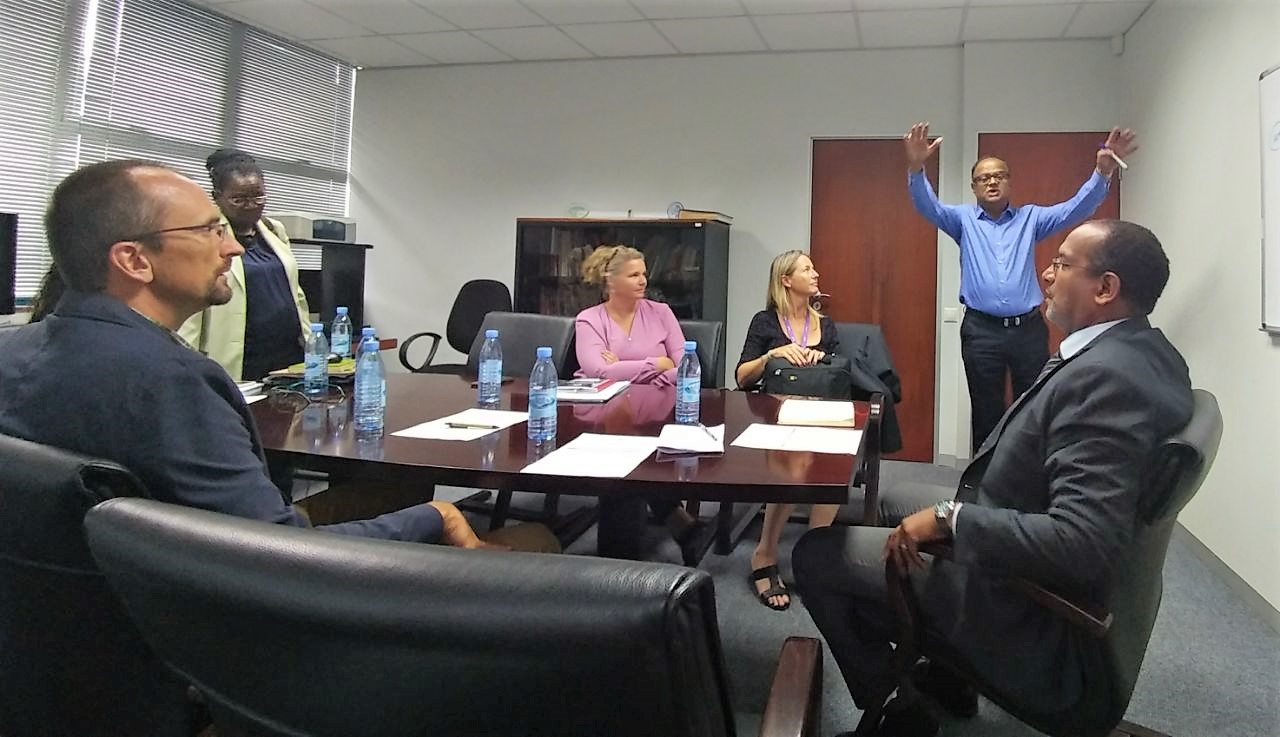
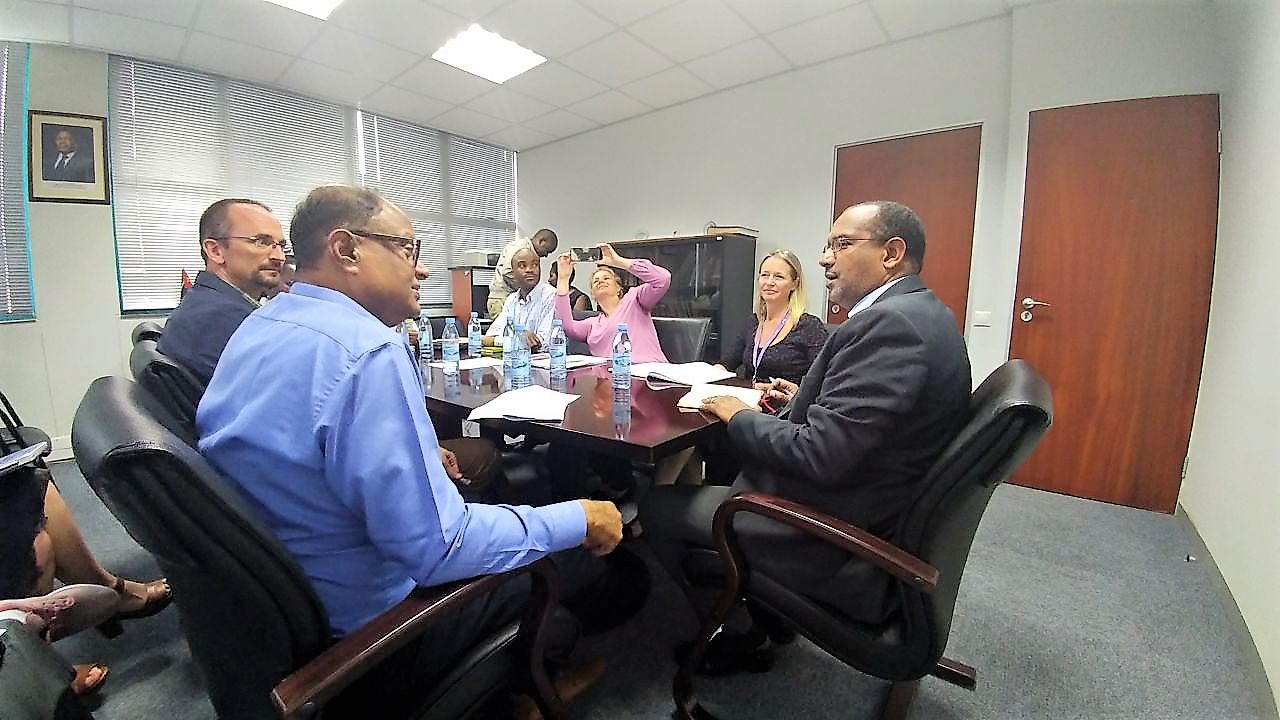
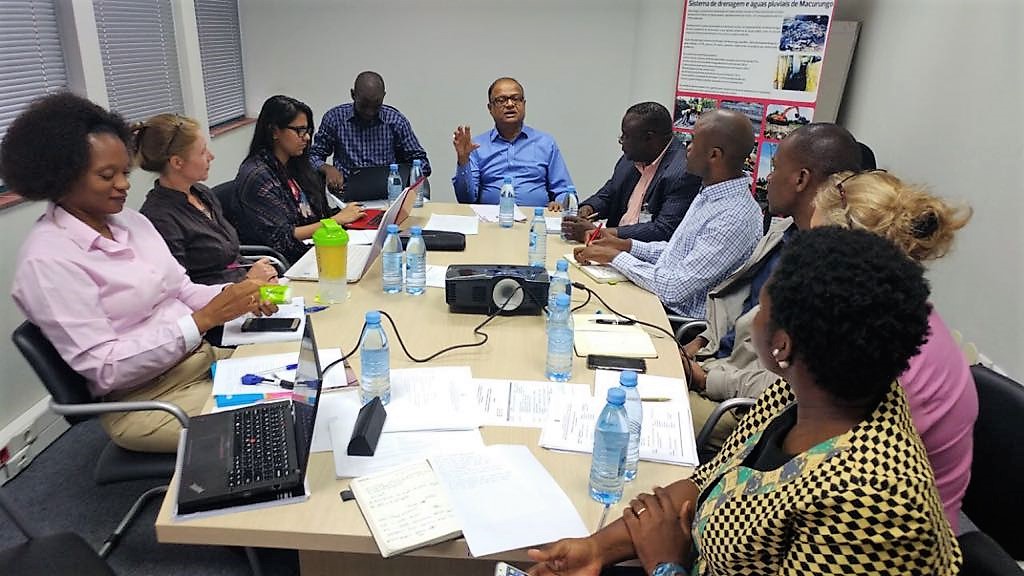
Report: Capacity Strengthening for Community Led Total Sanitation Report









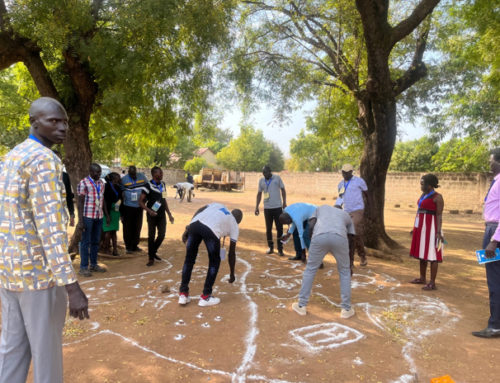
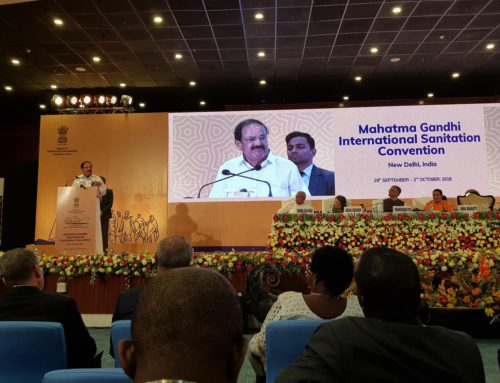
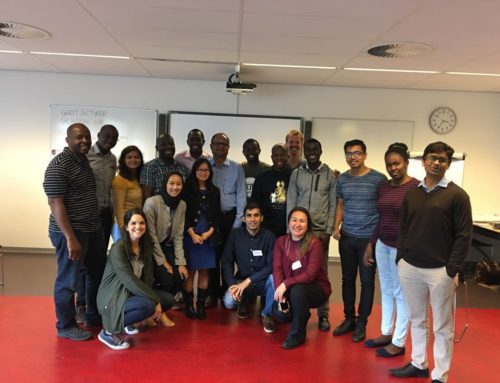

Leave A Comment